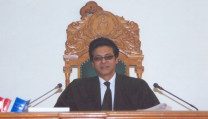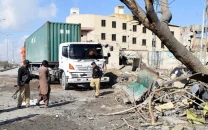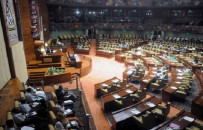PDM doing politics of long marches, sit-ins: Farrukh
Says economy has grown despite worldwide price hikes

Information and Broadcasting Minister Farrukh Habib on Sunday said that despite the politics of conspiracies, sit-ins and long marches by the Pakistan Democratic Movement (PDM), Pakistan Tehreek-e-Insaf (PTI) government did not create any hurdles to stop them.
Talking to a private news channel, he said PDM was a bunch of politically unemployed people who shut down power looms in Faisalabad in their tenures making a large number of workers jobless while the PTI government restored the power looms and created employment opportunities.
He said although the government was trying its best to minimise the impact of global inflation on poor people, which is directly affecting prices of various commodities especially oil products, Pakistan’s economy grew due to prudent policies of the government.
Read PDM announces new phase of anti-govt protests across country
The minister said that petrol prices suddenly jumped from $35 to $85 per barrel and the economy of the country couldn't bear the increase. “However, we are trying to control the inflation on a sustainable basis and in this connection, long term policies are being implemented to enhance the export with diversification”, he maintained.
Moreover, Habib said the price of coal had increased from $50 per tonne to $250 per tonne while the price of edible oil had risen from $500 per tonne to $1,200-1,300 per tonne in the international market. At the same time, the charges for container shipping were also increased from $2,000 to $8,000-10,000, he added.
He said that despite all the odds, talks were under way with the owners of ghee mills to bring down the prices of ghee for which the government was also ready for an appropriate reduction in taxes and levies, he added.
Read more Protest to continue till sending Imran packing, Bilawal says at Karachi rally
The minister further said the government would soon introduce food support programme Ehsaas cards to 12 million poor families that would directly subsidise food items.
Similarly, farmers were being provided Kissan cards to get maximum food production and to meet agricultural needs by getting direct subsidies, he said, adding that from November, health cards would also be issued that would provide up to Rs1 million annually for treatment.
Habib stated the farmers had witnessed bumper sugarcane crops and that would help to reduce the sugar price in the country. On the increase in power tariff, he said the government was forced to increase electricity prices as previous governments had set such a trap for the people where we had to pay electricity price whether we purchase it or not.



















COMMENTS
Comments are moderated and generally will be posted if they are on-topic and not abusive.
For more information, please see our Comments FAQ